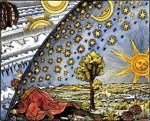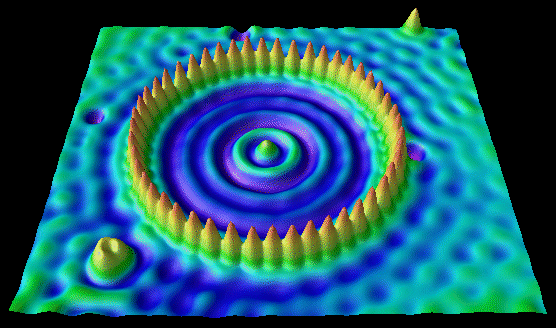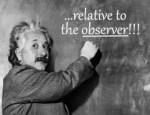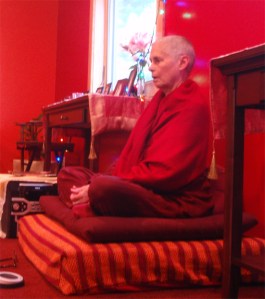What is the nature of existence? Surprisingly, the answer is knowable. In fact, it’s so well known they call it the perennial philosophy. It’s the idea that, at the core of our being, we are all One.
This may sound like religious wishful thinking, but it is also scientifically well supported, philosophically sound, and personally verifiable. We are here by some means, and this is it.
The answers to the big questions are knowable, not by our intellect, but because the source of the world happens to be what we are; consciousness. Waking up to this in a physical body is the goal of evolution, and humans have evolved just enough to achieve this.

The world is the wheel of God, turning round and round with all living creatures upon its rim. -Shvetashvatara Upanishad
Religions often symbolize our condition with a circle or a tree; a many-to-one relationship representing our true nature. The perennial philosophy is just pointing out that there are many paths leading to this realization. Even preeminent scientists can agree …though usually in private.
A human being is a spatially and temporally
limited piece of the whole…an optical
illusion of his consciousness. The striving
to free oneself from this delusion is the
one issue of true religion. –Albert Einstein
Why are we here?
Where do we come from?
Where are we going?
Answer:
There is an infinite, changeless reality
beneath the world of change.
This same reality lies at the core of
every human personality. The purpose
of life is to discover this reality
experientially—that is, to realize
God while here on earth.
-Eknath Easwaran
HOW IS IT WE ARE HERE? A case for the Perennial Philosophy.
Our human senses and cognitive abilities are limited, but we can still be certain there is something rather than nothing. For there to be anything, something outside this causality must have caused all this, since nothing ever comes from nothing (note that empty space is not nothing).
With the discovery of the Big Bang, science agreed there was a causal starting point. The universe was created, somehow. But then, quantum mechanics came along, and the physical determinism of the Big Bang was replaced the indeterminacy of quantum mechanics. Now the relevant question is: What’s keeping the lights on today? What is sustaining the quantum fields that generate the appearance of this physically deterministic universe. It’s not as though science knows what quantum fields are, or what causes them.
What is it that breathes fire into the
equations and makes a universe for
them to describe…Why does the universe
go to all the bother of existing?
–Stephen Hawking
So, we can say with great certainty that something outside of time and space must be the cause of this spacetime.
Time, nature, necessity, accident,
elements, energy, intelligence—none
of these can be the First Cause.
They are effects…
-Shvetashvatara Upanishad
But there still may be a big bias in our way. Western science works with quantitative data only, and ignores qualitative experience. Because of this, we’ve come to believe the data is more real than the experience. We have forgotten that all experiences only ever happen in consciousness. This misunderstanding is what leads to the Hard Problem of Consciousness.
In reality, the only thing we can be absolutely certain about is our own consciousness. That is to say, information from our mind and sensory perception is less reliable than the certainty of our own conscious awareness. We see the world through limited human senses, and our perception of it is less than perfect, but we can always be absolutely certain that we are witnessing it.
I am, I exist, is necessarily true
each time that I pronounce it,
or that I mentally conceive it.
–René Descartes | Meditation II
If we adjust the wording a little, we can now be absolutely certain about our conclusion:
Something outside of time and space must be the cause of this conscious experience.
This is essentially the Cosmological Argument, which was the worldview of Western science, from Aristotle (350 BC) to the 1700’s—when materialism became popular, replacing the ancient Parmenidean monism and Plato’s forms with matter itself being most fundamental.
But now, modern science is pointing back toward the perennial philosophy; the idea that consciousness is fundamental. Quantum mechanics tells us the universe only exists in experience, and otherwise resides as wave functions. So why all the resistance? With such a parsimonious explanation of the universe, the most skeptical of scientists should be all for it.
But, be advised. These concepts can be helpful, but they are just prep for direct experience.
Of course, if you still think consciousness is a random anomaly of matter left over from the Big Bang, then this conclusion would not satisfy you.
SO, WHAT IS CONSCIOUSNESS? It’s what we are.
How does something as immaterial as consciousness arise from something as unconscious as matter? -David Chalmers
Consciousness is fundamentally different from everything else. It’s not just different from mass, energy, space, and time, it’s also different from thoughts, feelings, intuitions, and memories. Those are things that happen in consciousness. Without consciousness what good are thoughts? In the West we conflate consciousness with thinking because we misinterpret Descartes. He didn’t really say, I think, therefore I am. He said, thinking is happening, therefore I must be an entity that thinks.
Our mental abilities are clearly a function of our human brain, but our conscious awareness, inherent to all lifeforms, is still a complete mystery to science. And that is what we really are. What are we when we’re unconscious? Our mind and body are earthly accumulations, but we are the conscious witness which has accumulated it. When we meditate—look back toward consciousness—we find it’s behind everything.
It takes some understanding to distinguish
between awareness and conceptualization.
It is said that the scope of
conceptualization is very limited,
whereas awareness pervades all that exists.
-Gen Lamrimpa
We can’t assume the brain causes it because we see conscious behavior in organisms that that don’t have a brain. Also, science can’t explain how life started on earth, but they do know it started as soon as conditions became available. So, given that everything is caused by something, and that consciousness is so distinctly different from everything, isn’t it possible that it has its own unique cause? Why isn’t that still a reasonable consideration?
I think that modern physics has definitely
decided in favor of Plato. In fact the
smallest units of matter are not physical
objects in the ordinary sense; they are
forms, ideas which can be expressed
unambiguously only in mathematical
language. –Werner Heisenberg
WHERE ARE WE GOING? Nowhere, until we can see past materialism.
Every man takes the limits of his
own field of vision for the limits of
the world. –Arthur Schopenhauer
This materialist view is the common sense view of physical determinism—that matter is fundamental, and consciousness is an epiphenomenon of the brain (matter), ultimately caused by the physical and chemical chaos of the Big Bang. And since time only began flowing as a result of the Big Bang, there is no chance of finding a first cause. It could be said that,
Modern science is based on the principle:
‘Give us one free miracle and we’ll explain
the rest.’ -Terence McKenna
Something can’t come from nothing, so the Big Bang theory still requires a cause. There must still be a super-space, or a mother universe; some place where a universe like ours can emerge from.
Because of the 200-year divergence physics took into materialism that ended a 100 years ago, most people still think science proved materialism explains the universe. It doesn’t. On the contrary. Materialism has been proven ontologically false for a century now.
Scientific materialism sees the world from only the body side of Descartes’ mind/body dualism, which is a philosophically weak position. Arguing from just the physical side, they are unable to explain many things—like the probabilistic nature of quantum mechanics, or how the universe is relative instead of objective, or even consciousness. In materialism, everything is physically deterministic (no conscious volition) so they must accept that consciousness itself is an illusion. But again, that’s because they are interpreting the world while limited to just the physical side of Descartes’ dualism. A further complication is that Cartesian dualism was never really about mind & body, but mind-body & consciousness. How much has that misunderstanding cost us?
If the fundamental building blocks of matter turned out to be physical, that would have given materialism a leg to stand on. But instead, physics found a fuzzy edge of reality where matter transitions into mathematics. So, matter is not fundamental. It’s a phase of quantum probability fields. Particles are how wave functions appear to us, though they never do fully exist in spacetime. In my opinion, quantum mechanics is studying the noumenal realm of Kantian philosophy. Clearly, physical spacetime reality has been shown to be not fundamental.
The Measurement Problem is a big problem for the materialist position. In quantum mechanics, the particles that make up matter always behave as probability distributions (wave functions) until observed, and only then do they transform into a particle in spacetime. To put it in physics parlance, to make a Heisenberg cut in the von Neumann chain you need a extra-physical element like consciousness. The Copenhagen Interpretation is by far the most widely held and experimentally supported interpretation of quantum mechanics, and it says the observer collapses the wave function. All objections to this view have provided no evidence. Clearly, observation plays a critical role in the emergence of matter. Once again, ontological materialism has been proven wrong.
A century ago, science discovered that consciousness causes the world to manifest by collapsing quantum states into physical reality. Therefore, the brain can’t cause consciousness, because consciousness causes the brain.
Mind no longer appears to be an accidental
intruder into the realm of matter…
we ought rather hail it as the creator
and governor of the realm of matter.
–Sir James Jeans
To make of the brain the condition on
which the whole image depends is in
truth a contradiction in terms, since
the brain is by hypothesis a part of
the image. -Henri Bergson
Meanwhile, materialists have spent the last century not advancing science, while no progress has been made on how electro-chemical states in the brain can give rise to conscious experience. Consciousness is regarded as an epiphenomenon. One favored theory is that it’s an emergent phenomenon caused by the vast integration of information in our large brains. But then why do all organisms, even as simple as a single cell, behave consciously?
The philosophy of the perennial philosophy is actually ontological idealism, which is well supported by modern physics, yet we still think scientists should be materialists. For an in-depth look, consider this 2-hr YouTube of an ontological idealist interviewed by a famous materialist:
Bernardo Kastrup on the Nature of Reality: Materialism, Idealism, or Skepticism | YouTube 2:14:21
IF WE ARE ONE, THEN WHY DON’T WE KNOW IT? Because we don’t meditate.
Brahman cannot be realized by those
who are enmeshed in life’s duality.
-Tejobindu Upanishad
Delusion arises from the duality of attraction and aversion. -Bhagavad Gita 7:27
Desire and aversion blind you to Suchness.
-Xinxin Ming
Don’t copy the behavior and customs of this world, but let God transform you into a new person by changing the way you think. -Romans 12:2
Born into a world of individual bodies, we learn to see ourselves as separate. By the age of three we develop an ego, and learn how to fulfill our egoic desires within the hierarchy of egos around us. This process is necessary for living in the world, but it hides our true nature, like clouds obscuring the sun.
This process of identifying with the egoic self is the topic of the Garden of Eden story. When Adam and Eve lived in the garden, they knew themselves to be God; both immanent and transcendent (egoic self and transcendent Self). But after living as individuals for, let’s say, three years, they forgot their transcendent nature, and began to only identify with their egoic selves—symbolized by eating fruit from the tree of duality, and suddenly becoming self-conscious.

The thought, “I am the doer,” is the bite of a poisonous snake. -Ashtavakra Gita
Forgetting their transcendent nature, they lost their identity with God, the animals, the garden, and found themselves in a world of separateness. This is our condition. But the way back to the garden can be as easy as looking inward in silent meditation. It’s just, most people don’t know this.
The Brihadaranyaka Upanishad says it most clearly: Separateness arises from identifying the Self with the body. The story of the Garden of Eden is meant to remind us of our true nature—that we are not just our mental and physical accumulations (the egoic self), but also our higher Self.
How Judaism and Christianity Differ on the Original Sin | YouTube 3:35
This realization feels like being born again, or waking up from a dream, but it’s not the egoic self that wakes up (this can be very destabilizing if the necessary prep work hasn’t been done). All the true religions are really just about this one thing.
There is only one Self in all creatures.
The One appears many, just as the moon
appears many, reflected in water.
-Amritabindu Upanishad
As long as we think we are the ego,
we feel attached and fall into sorrow…
When you realize that you are the Self…
you transcend the duality of life
and enter into the unitive state.
-Mundaka Upanishad
Brahman is all, and the Self is Brahman.
-Mandukya Upanishad
Consciousness is the Self.
-Shiva Sutras
I say, ‘You are gods; you are all
children of the Most High…’
-Psalms 82:6 | NLT
Don’t you realize that all of you together
are the temple of God
and that the Spirit of God lives in you?
-1 Corinthians 3:16 | NLT
Tao is your very nature.
Seeing this, everything is clear –
you walk free and undisturbed as Tao.
-Xinxin Ming
Remove the veil.
You will find your beloved within.
In every heart the Lord dwells.
Therefore, speak no bitter words.
The one who listens within you
Also listens within everyone else.
-Kabir
God dwells within you as you.
-Swami Muktananda
That one God who shines within everything,
Who is formless like the cloudless sky,
Is the pure, stainless, Self of all.
Without any doubt, that is who I am.
-Avadhuta Gita
I am not the mind. I am not the intellect or
intelligence. I am not the ego, nor am I a
deeper self or soul…I am Absolute
Awareness of Eternal Love and Bliss.
-Atma Shatakam
You are the Solitary Witness
of All That Is, forever free.
Your only bondage is not seeing This.
-Ashtavakra Gita
Lord! I’ve never known who I really am,
or You. I threw my love away on this
lousy carcass and never figured it
out: You’re me, I’m You. All I ever
did was doubt: Who am I?
Who are You? -Lal Ded



 that spacetime only exists relative to observers—that there is no objective universe out there. This is not how the scientific community interprets it. They would say the relativity part only applies to our perception of spacetime, not to spacetime itself (it’s not ontic, but merely epistemic). I disagree, and side with physicist’s like
that spacetime only exists relative to observers—that there is no objective universe out there. This is not how the scientific community interprets it. They would say the relativity part only applies to our perception of spacetime, not to spacetime itself (it’s not ontic, but merely epistemic). I disagree, and side with physicist’s like 




 Because of my life as a wildlife biologist, I’ve handled thousands of wild animals (mammals, birds, fish, but mostly amphibians & reptiles) and I can personally assure you, they were all conscious and exhibited emotions—their behavior would always betray their feelings. In fact, they behaved as I would if I were them (that’s a nonduality joke). We know animals are conscious and can feel. Why else would we have an
Because of my life as a wildlife biologist, I’ve handled thousands of wild animals (mammals, birds, fish, but mostly amphibians & reptiles) and I can personally assure you, they were all conscious and exhibited emotions—their behavior would always betray their feelings. In fact, they behaved as I would if I were them (that’s a nonduality joke). We know animals are conscious and can feel. Why else would we have an